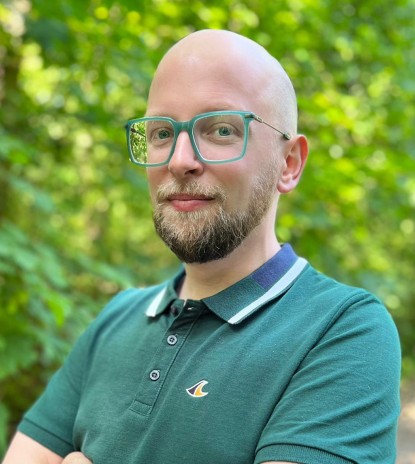Prof. Dr. Frederik Lermyte
Frederik Lermyte studied Chemistry at the University of Antwerp, and completed his PhD under the supervision of Prof. Frank Sobott. His PhD work focused on the use of ion mobility spectrometry and electron-based fragmentation in structural biology. He then worked as a Research Fellow at the University of Warwick for three years, where he used ultrahigh-resolution tandem mass spectrometry and synchrotron spectromicroscopy to study neurodegenerative diseases, and as a postdoctoral researcher at the University of Liège, before moving to TU Darmstadt. His research interests include fundamental and applied aspects of native MS, top-down protein analysis, and ion mobility spectrometry.
Dr. Edvaldo Maciel
Edvaldo Maciel achieved his bachelor’s degree in Chemistry at the University of Sao Paulo, Brazil in 2015. His Master’s degree in Analytical and Inorganic Chemistry was focused on synthesising graphene-based functional materials for being used as sorbent in miniaturised sample preparation techniques later applied in the determination of residues and contaminants from complex matrices. In his PhD under supervision of Prof. Fernando Lanças he worked on the development of automated analytical platforms for integrating miniaturized LC and mass spectrometry. Additionally, he possesses experience in the production of chromatographic columns. Since April 2022, he is a postdoctoral researcher at the Conformation-sensitive MS laboratory at TU Darmstadt coordinated by Prof. Frederik Lermyte.
M. Sc. Tanja Habeck
Tanja Habeck studied Biomolecular Engineering at the TU Darmstadt. Her master's degree focused on protein biochemistry and technical genetics. After her master thesis, in which she investigated the effect of bone sialoprotein coated polylactide scaffolds on new bone formation in vitro and in vivo, she started working at BioSpring Biotechnolgie GmbH. Here, the focus was on HPLC and LC/MS method development for therapeutic oligonucleotides. Since March 2021 she is part of the Lermyte research group as a PhD student.
M. Sc. Lisa Scharrenbroch
Lisa Scharrenbroch completed her bachelor's degree with a double degree in Forensic Science at Hochschule Bonn-Rhein-Sieg, University of Applied Sciences, and in Forensic and Analytical Sciences at Robert Gordon University in Aberdeen, Scotland. During her master's thesis, she developed methods for the characterization of seized tablets. After working on the detection and structure elucidation of additives in fuels using HPLC-HRMS as part of a research project at the Federal Criminal Police Office, she worked on LC-MS analysis of therapeutic oligonucleotides at BioSpring Biotechnologie GmbH. Since April 2021 she is doing her PhD at the TU Darmstadt in cooperation with the Federal Criminal Police Office.
M. Sc. Sarah Brandner
Sarah Brandner studied Biomolecular Engineering at the TU Darmstadt. The focus of her master's degree was on biochemistry and mass spectrometry. As a result of the lecture Advanced Mass Spectrometry in the Biosciences by Prof. Lermyte, she became aware of the research group and completed her master's internship there. As part of her master's thesis in the Conformation-Sensitive MS group, she investigated the structure, fragmentation and redox chemistry of metalloproteins in the gas phase. She stayed in the research group after her studies and has been pursuing a PhD since April 2023.
M. Sc. Christian Hake
Christian Hake studied biomolecular engineering at TU Darmstadt, with his studies focusing on immunology and protein technology. His Master's thesis focused on novel, cytomegalovirus-based vaccines against SARS-CoV-2 and was conducted at the Helmholtz-center for infection research. He started his PhD work in October 2023 in the working group of Prof. Lermyte and is currently focused on establishing a bottom-up proteomics pipeline.
M. Sc. Jonathan Eisert
Jonathan Eisert studied biochemistry at the Goethe University in Frankfurt, specializing mainly in biophysical methods for the analysis of molecular interactions. During his bachelor program, he worked on the development of a novel vaccine candidate and investigated the immune responses of different patient sera. Jonathan engineered and characterized a novel Cereblon E3 ligase construct for simplified interaction studies with ligands for targeted protein degradation during his joint master's project with Goethe University and BMLS in Frankfurt and Merck KGaA in Darmstadt. He used state-of-the-art biophysical and structure-biological methods and tools to evaluate ligand binding and complex formation. He is currently pursuing his PhD at TU Darmstadt and joined Frederik Lermyte's research group in October 2023.
M. Sc. Stephanie Mandic
Stephanie Mandic completed her Bachelor‘s degree in biological chemistry at the Mannheim University of Applied Sciences and transferred afterwards to the Coburg University of Applied Sciences with a focus on biological analysis. Already during her Bachelor studies she became involved with the analysis of antibodies using mass spectrometry and continued with this topic in her Master thesis at Miltenyi Biotec in Bergisch Gladbach. One year of employment in the department of analytics at Miltenyi Biotec followed, in which she could strengthen her know-how and gain further hands-on experience in sample preparation and mass spectrometry analysis for various applications. In September 2021 Stephanie started with her PhD project at Miltenyi Biotec and is now using a tandem mass spectrometry-based approach focusing on the generation of antibodies for diagnostic processes.
Alumni
Dr. Taylor Zaniewski (2024), postdoctoral researcher
Thomas Nehls (2021 – 2024), PhD student
Silvana Zurmühl (2022 – 2023), MSc student
Kevin Kretschmer (2021 – 2022), MSc student
Steve Ikenze (2022 – 2023), BSc student


















